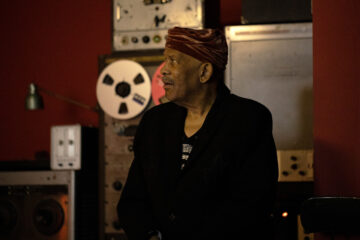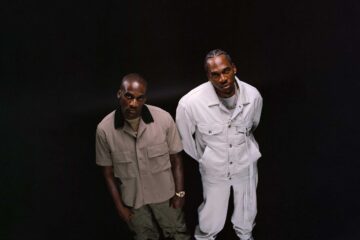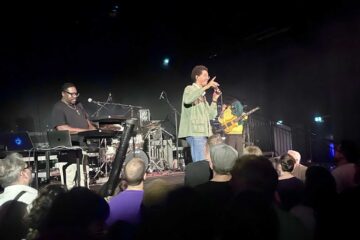Whoever now talks about James Dewitt Yancey alias J Dilla will try to find words beyond this planet to adequately describe their old campanion. From Bilal to Common and his own mother: Whenever someone talks about Dilla, the adjective »superhuman« seems inevitable.
However, what does that even mean – »superhuman«? It can mean two different things, actually. For once, it can suggest that someone perfects their craft like no-one else before, thus reaching a possible optimum result.
Or he could do something in a way that no-one else before thought possible, intuitively venturing into the unknown.
What makes a master a master is the combined reign of absolute control and chaos in their work. When Roger Federer was servicing during his prime, his balls would reach their target with an improbable probability, as if their trajectory course had been calculated by a perfect machine. His opponents however could, with some time, have analysed, anticipated and finally surpassed the moves of the machine.
But real greatness arises exactly where a rupture runs through perfection, making it something more than perfect. It is exactly what the all too human spectators that we are try to describe as something bigger, as magic, something godly. Like Federer’s game, like Coltrane’s saxophone. Like J Dilla’s beats.
Real greatness resets the status quo. To create it, and finally to comprehend it, you have to re-think conventional categories. In Dilla’s case, that means you’ll have to reconsider the paradigm of what The Right Technique is. And what time itself is, too. You have to either forget it or you have to speak about another kind of time. Dilla Time.
All you see is euphoric eyes. Eyes that are re-opened every time when Questlove speaks about Dilla changing the way he plays the drums. How Dilla liberated it. Quick recap: Questlove himself is one of the most significant drummers of our time. For him, Dilla’s drum programming came as an epiphany because Dilla didn’t give a fuck about the conventional wisdom, the wisdom according to which the ultimate criterion for good drumming was that every beat has to come at the right time. Questlove on Dilla: »It sounded like the kick drum was played by a drunk three-year-old.« »Are you allowed to do that,« the Roots’ drummer asked. Ab-so-lu-tely, Dilla’s discography loudly retorts.
Please find »The Shining« by J Dilla [in our Web shop](https://www.hhv.de/shop/de/artikel/j-dilla-aka-jay-dee-the-shining-hhv-gold-vinyl-edition-598665)
Dilla’s main tool, the Akai MPC3000, has a function that guarantees that every beat keeps perfect time, quantize. Everything that doesn’t quite fit in will be forcibly fit back in. To quantize is to make rhythms superhumanly straight. By renouncing this function entirely, Dilla became a superhuman producer. Which is where this text has arrived back at the beginning – wherever a rupture runs through perfection, something arises that is more than perfect.
Dilla did not care if the drum came late to the party. That’s how his music became a feast of its own, something whose signature sound still reverberates in so many instrumentals today. Sometimes the snare would precede the beat, sometimes it would lag behind, while at the same time other elements of the song would tag along. Some smoothly quantized elements align with swung ones, a rhythmic conflict occurs; a weirdly disjointed feeling of time, full of glitches, if you will. What makes a master a master is the combined reign of absolute control and chaos in their work.
If you take those glitches and Dilla’s other trademark trick, cutting off the high frequencies of his samples (see »E=MC2« from »The Shining«), you have the foundation for what, directly after Dilla, became a success story of its own as a style in its own right. Dilla was the Brainfeeder for the heads of this new movement!
2004, he moved to Los Angeles. In 2006, a certain Daddy Kev laid the foundation for his now-legendary party series Low End Theory and his label Alpha Pup. Both were dedicated univocally to: the beat. The disjointed beat. Flying Lotus’s »Reset« EP is being released just a year after »The Shining«. It is the first work from Los Angeles’s new beat scene that reaches a wider audience. It is also the first and most straightforward indicator that Dilla would survive through his music. If you were to describe Dilla’s music as a rocket launched into the unknown, it is the whole vessel that made the journey into the cosmos possible in the first place. »Reset« is this exact rocket after the first stage has fallen back to earth: the same vehicle, just twice accelerated and on its way into space.
Flying Lotus starts where »The Shining« ends. »Won’t Do« fades out on bleeps, woozy synths and angular drums – it could bleed right into the »Reset« EP and no-one would even notice. You could draw a Dilla line through so many albums; only thanks to the blueprint provided by Dilla’s soul and sloppy-ass beats Flying Lotus could create a track like 2010’s »Do The Astral Plane«, or Kendrick Lamar »These Walls« some five years later.
Those are just two prominent examples for the music emerging from a territory that Dilla was the first to have ventured into. It is a territory in which another belief prevails about what The Right Technique might be.
»The Shining« is the first Dilla album to be posthumously released. He himself considered it to be 75% only done while anyone else (his mother Maureen Yancey and his label, BBE) will tell you that the only thing missing from it was the finishing touch of a mastering engineer. Because really, it was about 95% done. But Dilla was as much as a perfectionist as he was chaotic.
Nowadays, it seems hard to summarise Dilla’s work. In his lifetime, it was simply impossible. There was simply no way to get to the heart of it, to just lay a finger on the record and stop it mid-song to say: that’s the Dilla sound. With the release of any of his records, he was already two steps ahead. Some say years, others think it is decades. If anything, you can divide his body of works in different epochs. On »The Shining«, they all join each other in disjointed time. On it, boom bap-Dilla, the Soulquarian, the futuristic Dilla come together to shortly after his death deliver the news that this guy would live forever.
Before the »The Shining« came »Donuts«, produced on Dilla’s sickbed. Beats only. 32 instrumentals, all except one under two minutes long. To speak of sketches however wouldn’t do them justice. Dilla doesn’t sketch out what he could do on a beat, but instead fleshes it out in the least possible time. It is an album that feels like a final self-realisation. Those beats were so far out of any zone that no rapper could possibly go hard in the paint on them. It is an album that is not only touching because his audience bears witness to a magician with an infinite amount of aces up his sleeves, but because death is already present on it. On »Stop«, Dilla uses a Jadakiss sample, distorting it with scratches, letting it blurt out a sinister question: »is death real?«
Please find »The Shining« by J Dilla [in our Web shop](https://www.hhv.de/shop/de/artikel/j-dilla-aka-jay-dee-the-shining-hhv-gold-vinyl-edition-598665)
James Yancey dies on February 10, 2006. He is 32 years old. He dies before his time. On August 22nd of the same year, »The Shining« is released. With the same running time as its predecessor but only twelve songs, it is a rap album in the classical sense. Featured are Busta Rhymes, Common, Pharoahe Monch, Madlib, Guilty Simpson, D’Angelo, MED, J.Rocc, Karriem Riggins, Dwele and Black Thought – old companions. Dilla was never an economist. Just imagine that he declined to work on Jay Z’s »The Blueprint« because he was too busy producing the album of some local rapper. That is why this last round of high-fives on »The Shining« feels so right, feels just like a last family affair. It also almost incidentally sums up a decade of hip hop music through every of the different rappers represented on it.
A classical highlight is »So Far To Go« with Common and D’Angelo. Dreamy and a bit off-kilter, it brings to mind »Like Water For Chocolate« or Common’s Grammy-winning »Be« album, which featured two beats by Dilla. Or the brass-heavy »Love« whose Impressions sample serves as a reminder that it was Dilla who practically invented all the whole neo soul. There’s the gloriously stretched-out Giorgio Moroder sample on the aforementioned »E=MC2« with its car-rattling bassline which wriggles monstrously around the beat. There’s the synthesizers on »Over The Breaks« or »Body Movin«, which are Detroit to the bone – a nod to the city that shaped Dilla as much as he shaped it by making it a cornerstone of the hip hop geography long after it had been recognised as the soul capital of the States and the birthplace of techno.
You get soul, you get funk, you get the intricate kind of stuff; the kind of stuff that made a lot of people say that Dilla did more for the renaissance of jazz than most jazz musicians (those who would play the oldies, anyway). Of course you get raw rap material. You get an infinite number of modes of expression, all of which he had mastered.
Thus, »The Shining« is, just like Dilla’s whole career, an argument to be made for the case that any distinction between old school and new school, any weighing up their respective qualities, is nothing but utter bullshit. Dilla has never given a fuck. It was all about the feeling and if you can bang away to it on your school bench or not.

Dilla, Timbaland and Neptunes are the ones that have put an end to the linearity of rap time by taking a bow before rap’s musical past while embracing the future. »This guy was like the futuristic Pete Rock,« said Pete Rock. Said Pete Rock!
Please find »The Shining« by J Dilla [in our Web shop](https://www.hhv.de/shop/de/artikel/j-dilla-aka-jay-dee-the-shining-hhv-gold-vinyl-edition-598665)









